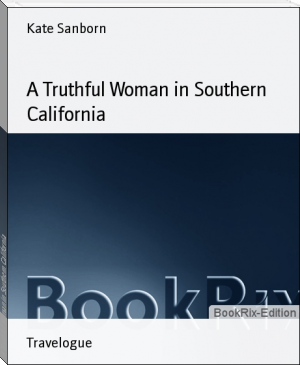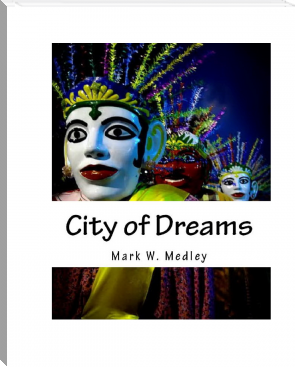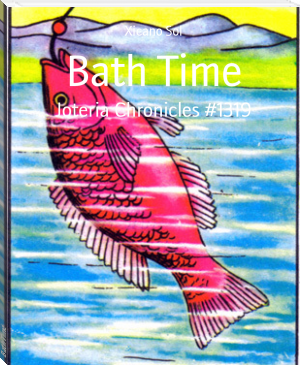A Truthful Woman in Southern California, Kate Sanborn [best thriller novels of all time .txt] 📗

- Author: Kate Sanborn
Book online «A Truthful Woman in Southern California, Kate Sanborn [best thriller novels of all time .txt] 📗». Author Kate Sanborn
/> It keeps on the ground most of the time, and can run with such swiftness that it cannot be easily overtaken by horse and hounds. It has a tail longer than its body, which it bears erect. It kills beetles, toads, birds, and mice, but has a special dislike for the rattlesnake, and often meets him and beats him in fair combat. When it finds one sleeping or torpid it makes a circle of cactus thorns around him so he cannot escape - for "future reference," as my driver said.
This thorny circle is akin to the lariat made of horsehair, the ends sticking out roughly all around, with which the Indian used to encircle himself before going to sleep, as a protection from the rattlesnake, who could not cross it. But here we are at Los Angeles. Hear the bawling cabbies: "This way for The Westminster!" "Hollenbeck Hotel!"
CHAPTER V.
LOS ANGELES AND ROUND ABOUT.
"O southland! O dreamland! with cycles of green;
O moonlight enchanted by mocking-bird's song;
Cool sea winds, fair mountains, the fruit-lands between,
The pepper tree's shade, and the sunny days long."
Los Angeles is the chief city of Southern California, and truly venerable in comparison with most places in the State - founded in 1781, now one hundred and twelve years old. Its full name, "Nuestra Senora la Reina de los Angeles," "musical as a chime of bells," would hardly do in these days, and "The City of the Angels," as it is sometimes called, scarcely suits the present big business-y place, which was started by those shrewd old padres when everything west of the Alleghanies was an almost unknown region, and Chicago and St. Louis were not thought of. These Fathers were far-sighted fellows, with a keen eye for the beautiful, sure to secure good soil, plenty of water, and fine scenery for a settlement. Next came the Hispano-American era of adobe, stage-coaches, and mule teams, now replaced by the purely American possessions, with brick, stone, vestibule trains, and all the wonders of electricity. It is now a commercial centre, a railroad terminal, with one hundred miles of street-car track within the city limits, carrying twelve million passengers yearly. It has outgrown the original grant of six miles square, and has a city limit, and the first street traversed this square diagonally. It lies on the west bank of the Los Angeles River, one of those peculiar streams which hides itself half the year only to burst forth in the spring in a most assertive manner. There are fine public buildings, fifty-seven churches, to suit all shades of religious belief, two handsome theatres, several parks, and long streets showing homes and grounds comparing favorably with the best environs of Eastern cities. It is well to drive through Adams and Figueroa streets before you leave. There are no attractive hotels at present; but one is so greatly needed and desired that it will soon be designed and realized.
Madame de Staël was right when she said she greatly preferred meeting interesting men and women to admiring places or scenery. Among my pleasantest memories of Los Angeles are my visits to Madame Fremont in her pretty red cottage, presented by loving friends. It is a privilege to meet such a clever, versatile woman. Her conversation flashes with epigrams and pithy sayings, and her heart is almost as young as when it was captured by the dashing "Pathfinder."
I believe there are men still existing who keep up the old absurd fallacy that women are deficient in wit and humor! She would easily convert all such.
The Coronels, to whom Mrs. Jackson was so indebted and of whom she wrote so appreciatively, are still in the same home, cherishing her memory most fondly, her photograph being placed in a shrine where the sweet-faced madame kneels daily, and her books and knick-knacks are preserved as precious souvenirs.
Don Antonio Coronel is truly a most interesting personage, the last specimen of the grand old Spanish régime. His father was the first schoolmaster in California, and the son has in his possession the first schoolbook printed on this coast, at Monterey in 1835, a small catechism; also the first book printed in California, a tiny volume dated 1833, the father having brought the type from Spain.
I was taken to the basement to see a rare collection of antiquities. In one corner is a cannon made in 1710, and brought by Junipero Serra. Ranged on shelves is a collection such as can be found nowhere else, of great value: strange stone idols, a few specimens of the famous iridescent pottery, queer ornaments, toys, and relics. In another corner see the firearms and weapons of long ago: old flintlocks, muskets, Spanish bayonets, crossbows, and spears. There are coins, laces, baskets, toys, skulls, scalps, and a sombrero with two long red pennons, on which each feather represents a human scalp. Upstairs there are early specimens of Mexican art; one of the oldest pictures of Junipero Serra; groups in clay modelled by the Dona Mariana of Mexican scenes; feather pictures made from the plumage of gorgeous birds - too much to remember or describe here. But I do believe that if asked to say what they valued most, they would point to the little wooden table where their dear friend sat when she wrote the first pages of "Ramona."
For the stranger Los Angeles is the place to go to to see a new play, or marvel at the display of fruits seen at a citrus fair - forts made of thousands of oranges, and railroad stations and crowns of lemons, etc. - and admire a carnival of flowers, or for a day's shopping; but there are better spots in which to remain. I found the night air extremely unpleasant last winter, and after hearing from a veracious druggist, to whom I applied for a gargle, that there was an epidemic of grip in the city, and that many died of pneumonia and that a small majority of the invalids got well, I packed my trunk hastily and started for Pasadena.
Those who live in the city and those who do not dislike raw, bracing winds from the ocean pronounce Los Angeles to be the only place worth living in in all Southern California. Each place has its supporters ignoring all other attractions, and absolutely opposite accounts of the weather have been seriously given me by visitors to each. For those who must be "high and dry" to improve, the rainy season is certainly unsafe.
Los Angeles is also a place to go from to the beach at Santa Monica, and Redondo, or that wondrous island, "Santa Catalina," which has been described by Mr. C. F. Holder in the Californian so enthusiastically that I should think the "Isle of Summer" could not receive all who would unite to share his raptures - with a climate nearer to absolute perfection than any land, so near all the conveniences of civilization, and everything else that can be desired. His first jew-fish or black sea-bass weighed 342½ pounds, and a dozen other varieties are gamy and plentiful; fine sport with the rifle in the upland region, wealth of verdure along the trail; below, good hotel, beaches, bathing, evening concerts - "the true land of sweet idleness, where one can drift around with all nature to entertain." To be strictly truthful, I must add that the hotel was built just over an old Indian burying-ground, therefore cases of typhoid fever are not unknown.
CHAPTER VI.
PASADENA.
"If there be an Elysium upon earth,
It is this, it is this."
For my own taste, I prefer Pasadena, the "Crown of the Valley" - nine miles from Los Angeles, but eight hundred feet higher and with much drier air, at the foot of the Sierra Madre range, in the beauteous San Gabriel Valley. Yes, Pasadena seems to me as near Eden as can be found by mortal man.
Columbus in a letter to Ferdinand and Isabella said, "I believe that if I should pass under the equator in arriving at this higher region of which I speak, I should find there a milder temperature and a diversity in the stars and in the waters.... I am convinced that there is the Terrestrial Paradise."
Poor persecuted Columbus! I wish he could have once seen Pasadena, the very spot he dreamed of. Can I now write calmly, critically, judicially of what I see, enjoy, admire and wonder over? If I succeed it will be what no one else has done. I was here last year and gave my impressions then, which are only strengthened by a second visit, so that I will quote my own words, which read like the veriest gush, but are absolutely true, came straight from my heart, and, after all, didn't half tell the story.
I am fascinated and enthralled by your sun-kissed, rose-embowered, semi-tropical summer-land of Hellenic sky and hills of Hymettus, with its paradoxical antitheses: of flowers and flannels; strawberries and sealskin sacks; open fires with open windows; snow-capped mountains and orange blossoms; winter looking down upon summer - a topsy-turvy land, where you dig for your wood and climb for your coal; where water-pipes are laid above ground, with no fear of Jack Frost, and your principal rivers flow bottom side up and invisible most of the time; where the boys climb up hill on burros and slide down hills on wheels; where the trees are green all the year, and you go outdoors in December to get warm; where squirrels live in the ground with owls for chums, while rats build in the trees, and where water runs up hill; where anything unpleasant, from a seismic disturbance to mosquitoes in March, is "exceptional" and surprising. A land where there are no seasons, but where sunshine and shade are so distinctly marked that one can be easily half baked on one side and dangerously chilled on the other.
Then the Climate - spell it with a capital, and then try to think of an adjective worthy to precede it. Glorious! Delicious! Incomparable! Paradisaical!!! To a tenderfoot straight from New Hampshire, where we have nine months of winter and three of pretty cold weather, where we have absolutely but three months that are free from frost, this seems like enchanted ground.
A climate warm, with a constant refreshing coolness in its heart; cool, with a latent vivifying warmth forever peeping out of its coat-tail pocket.
June does not define it, nor September. It has no synonym, for there is nothing like it. I am glad that I have lived to see hedges of heliotrope, of geraniums and calla-lilies. I remember, in contrast, solitary calla plants that I have nursed with care all winter in hopes of one blossom for Easter. And I do not feel sure that I can ever tear myself away. I am reminded of good old Dr. Watts, who was invited by Lady Abney to pass a fortnight at her home, and remained for forty years.
Here we all unconsciously eat the lotus in some occult fashion, are straightway bewitched and held willing captives. I have looked up the lotus, about which so much is said or sung and so little definitely known, and find it is a prickly shrub of Africa, bearing a fruit of a sweet taste, and the early Greeks knew all about its power. Homer in the Odyssey says that whoever ate of the fruit wished never to depart nor again to see his native land. Many of Ulysses' sailors ate this fruit,
This thorny circle is akin to the lariat made of horsehair, the ends sticking out roughly all around, with which the Indian used to encircle himself before going to sleep, as a protection from the rattlesnake, who could not cross it. But here we are at Los Angeles. Hear the bawling cabbies: "This way for The Westminster!" "Hollenbeck Hotel!"
CHAPTER V.
LOS ANGELES AND ROUND ABOUT.
"O southland! O dreamland! with cycles of green;
O moonlight enchanted by mocking-bird's song;
Cool sea winds, fair mountains, the fruit-lands between,
The pepper tree's shade, and the sunny days long."
Los Angeles is the chief city of Southern California, and truly venerable in comparison with most places in the State - founded in 1781, now one hundred and twelve years old. Its full name, "Nuestra Senora la Reina de los Angeles," "musical as a chime of bells," would hardly do in these days, and "The City of the Angels," as it is sometimes called, scarcely suits the present big business-y place, which was started by those shrewd old padres when everything west of the Alleghanies was an almost unknown region, and Chicago and St. Louis were not thought of. These Fathers were far-sighted fellows, with a keen eye for the beautiful, sure to secure good soil, plenty of water, and fine scenery for a settlement. Next came the Hispano-American era of adobe, stage-coaches, and mule teams, now replaced by the purely American possessions, with brick, stone, vestibule trains, and all the wonders of electricity. It is now a commercial centre, a railroad terminal, with one hundred miles of street-car track within the city limits, carrying twelve million passengers yearly. It has outgrown the original grant of six miles square, and has a city limit, and the first street traversed this square diagonally. It lies on the west bank of the Los Angeles River, one of those peculiar streams which hides itself half the year only to burst forth in the spring in a most assertive manner. There are fine public buildings, fifty-seven churches, to suit all shades of religious belief, two handsome theatres, several parks, and long streets showing homes and grounds comparing favorably with the best environs of Eastern cities. It is well to drive through Adams and Figueroa streets before you leave. There are no attractive hotels at present; but one is so greatly needed and desired that it will soon be designed and realized.
Madame de Staël was right when she said she greatly preferred meeting interesting men and women to admiring places or scenery. Among my pleasantest memories of Los Angeles are my visits to Madame Fremont in her pretty red cottage, presented by loving friends. It is a privilege to meet such a clever, versatile woman. Her conversation flashes with epigrams and pithy sayings, and her heart is almost as young as when it was captured by the dashing "Pathfinder."
I believe there are men still existing who keep up the old absurd fallacy that women are deficient in wit and humor! She would easily convert all such.
The Coronels, to whom Mrs. Jackson was so indebted and of whom she wrote so appreciatively, are still in the same home, cherishing her memory most fondly, her photograph being placed in a shrine where the sweet-faced madame kneels daily, and her books and knick-knacks are preserved as precious souvenirs.
Don Antonio Coronel is truly a most interesting personage, the last specimen of the grand old Spanish régime. His father was the first schoolmaster in California, and the son has in his possession the first schoolbook printed on this coast, at Monterey in 1835, a small catechism; also the first book printed in California, a tiny volume dated 1833, the father having brought the type from Spain.
I was taken to the basement to see a rare collection of antiquities. In one corner is a cannon made in 1710, and brought by Junipero Serra. Ranged on shelves is a collection such as can be found nowhere else, of great value: strange stone idols, a few specimens of the famous iridescent pottery, queer ornaments, toys, and relics. In another corner see the firearms and weapons of long ago: old flintlocks, muskets, Spanish bayonets, crossbows, and spears. There are coins, laces, baskets, toys, skulls, scalps, and a sombrero with two long red pennons, on which each feather represents a human scalp. Upstairs there are early specimens of Mexican art; one of the oldest pictures of Junipero Serra; groups in clay modelled by the Dona Mariana of Mexican scenes; feather pictures made from the plumage of gorgeous birds - too much to remember or describe here. But I do believe that if asked to say what they valued most, they would point to the little wooden table where their dear friend sat when she wrote the first pages of "Ramona."
For the stranger Los Angeles is the place to go to to see a new play, or marvel at the display of fruits seen at a citrus fair - forts made of thousands of oranges, and railroad stations and crowns of lemons, etc. - and admire a carnival of flowers, or for a day's shopping; but there are better spots in which to remain. I found the night air extremely unpleasant last winter, and after hearing from a veracious druggist, to whom I applied for a gargle, that there was an epidemic of grip in the city, and that many died of pneumonia and that a small majority of the invalids got well, I packed my trunk hastily and started for Pasadena.
Those who live in the city and those who do not dislike raw, bracing winds from the ocean pronounce Los Angeles to be the only place worth living in in all Southern California. Each place has its supporters ignoring all other attractions, and absolutely opposite accounts of the weather have been seriously given me by visitors to each. For those who must be "high and dry" to improve, the rainy season is certainly unsafe.
Los Angeles is also a place to go from to the beach at Santa Monica, and Redondo, or that wondrous island, "Santa Catalina," which has been described by Mr. C. F. Holder in the Californian so enthusiastically that I should think the "Isle of Summer" could not receive all who would unite to share his raptures - with a climate nearer to absolute perfection than any land, so near all the conveniences of civilization, and everything else that can be desired. His first jew-fish or black sea-bass weighed 342½ pounds, and a dozen other varieties are gamy and plentiful; fine sport with the rifle in the upland region, wealth of verdure along the trail; below, good hotel, beaches, bathing, evening concerts - "the true land of sweet idleness, where one can drift around with all nature to entertain." To be strictly truthful, I must add that the hotel was built just over an old Indian burying-ground, therefore cases of typhoid fever are not unknown.
CHAPTER VI.
PASADENA.
"If there be an Elysium upon earth,
It is this, it is this."
For my own taste, I prefer Pasadena, the "Crown of the Valley" - nine miles from Los Angeles, but eight hundred feet higher and with much drier air, at the foot of the Sierra Madre range, in the beauteous San Gabriel Valley. Yes, Pasadena seems to me as near Eden as can be found by mortal man.
Columbus in a letter to Ferdinand and Isabella said, "I believe that if I should pass under the equator in arriving at this higher region of which I speak, I should find there a milder temperature and a diversity in the stars and in the waters.... I am convinced that there is the Terrestrial Paradise."
Poor persecuted Columbus! I wish he could have once seen Pasadena, the very spot he dreamed of. Can I now write calmly, critically, judicially of what I see, enjoy, admire and wonder over? If I succeed it will be what no one else has done. I was here last year and gave my impressions then, which are only strengthened by a second visit, so that I will quote my own words, which read like the veriest gush, but are absolutely true, came straight from my heart, and, after all, didn't half tell the story.
I am fascinated and enthralled by your sun-kissed, rose-embowered, semi-tropical summer-land of Hellenic sky and hills of Hymettus, with its paradoxical antitheses: of flowers and flannels; strawberries and sealskin sacks; open fires with open windows; snow-capped mountains and orange blossoms; winter looking down upon summer - a topsy-turvy land, where you dig for your wood and climb for your coal; where water-pipes are laid above ground, with no fear of Jack Frost, and your principal rivers flow bottom side up and invisible most of the time; where the boys climb up hill on burros and slide down hills on wheels; where the trees are green all the year, and you go outdoors in December to get warm; where squirrels live in the ground with owls for chums, while rats build in the trees, and where water runs up hill; where anything unpleasant, from a seismic disturbance to mosquitoes in March, is "exceptional" and surprising. A land where there are no seasons, but where sunshine and shade are so distinctly marked that one can be easily half baked on one side and dangerously chilled on the other.
Then the Climate - spell it with a capital, and then try to think of an adjective worthy to precede it. Glorious! Delicious! Incomparable! Paradisaical!!! To a tenderfoot straight from New Hampshire, where we have nine months of winter and three of pretty cold weather, where we have absolutely but three months that are free from frost, this seems like enchanted ground.
A climate warm, with a constant refreshing coolness in its heart; cool, with a latent vivifying warmth forever peeping out of its coat-tail pocket.
June does not define it, nor September. It has no synonym, for there is nothing like it. I am glad that I have lived to see hedges of heliotrope, of geraniums and calla-lilies. I remember, in contrast, solitary calla plants that I have nursed with care all winter in hopes of one blossom for Easter. And I do not feel sure that I can ever tear myself away. I am reminded of good old Dr. Watts, who was invited by Lady Abney to pass a fortnight at her home, and remained for forty years.
Here we all unconsciously eat the lotus in some occult fashion, are straightway bewitched and held willing captives. I have looked up the lotus, about which so much is said or sung and so little definitely known, and find it is a prickly shrub of Africa, bearing a fruit of a sweet taste, and the early Greeks knew all about its power. Homer in the Odyssey says that whoever ate of the fruit wished never to depart nor again to see his native land. Many of Ulysses' sailors ate this fruit,
Free e-book «A Truthful Woman in Southern California, Kate Sanborn [best thriller novels of all time .txt] 📗» - read online now
Similar e-books:





Comments (0)